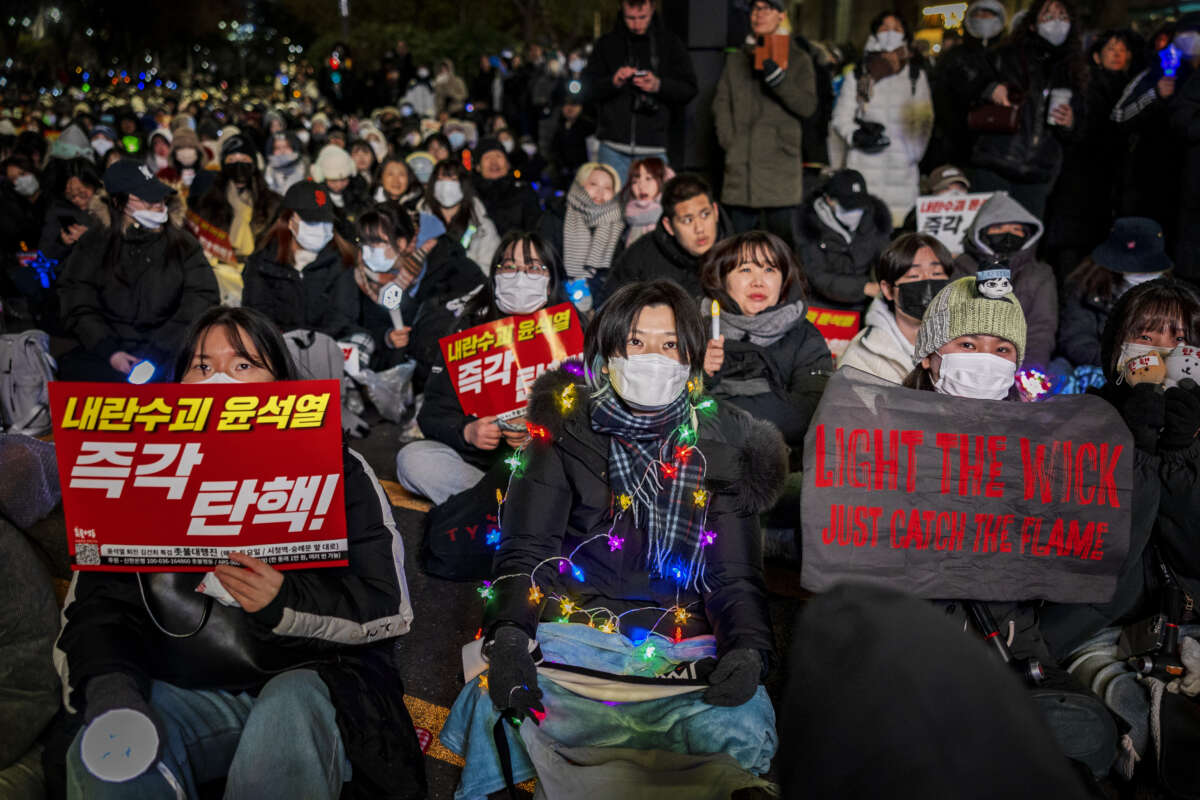Did you know that Truthout is a nonprofit and independently funded by readers like you? If you value what we do, please support our work with a donation.
A bid to impeach South Korean President Yoon Suk Yeol over his short-lived imposition of martial law failed Saturday after lawmakers from his conservative party left the National Assembly chamber and refused to take part in the vote.
Supporters of impeachment needed at least eight members of Yoon’s People Power Party (PPP) to support removing the president, who apologized to the nation in a one-minute-long address Saturday morning but refused to step down after he briefly instituted martial law in a stated attempt to “eradicate shameful pro-North Korea” forces, plunging the country into a political crisis.
Yoon’s gambit sparked immediate and sustained protests and was widely seen as a coup attempt.
Saturday’s impeachment effort drew a massive number of people into the streets outside the National Assembly building despite below-freezing temperatures, and demonstrators voiced outrage when they learned that Yoon’s allies thwarted the initial attempt to oust him. Just two PPP members returned to the National Assembly chamber to cast a ballot Saturday.
“I am so angry. I can’t find the words to describe my frustration,” 23-year-old Kim Hyo-lim told The New York Times. “I am devastated, but I feel honored to be a part of this historic moment for my country.”
Another demonstrator said they intend to protest “every weekend” until Yoon is removed.
Organizers said roughly a million people took part in demonstrations Saturday in support of Yoon’s impeachment. Many also demanded his arrest.
The Financial Times reported following the failed impeachment effort that Yoon — whose term expires in 2027 — and PPP leaders “appeared to have reached a deal whereby the president would hand over political direction of the country to his party and agree to stand down at a time of the party’s choosing, in return for support in the impeachment vote.”
The Korean Confederation of Trade Unions (KCTU), which has over 1.1 million members, called PPP lawmakers who boycotted Saturday’s vote “accomplices in treason.”
“The People Power Party has turned its back on the people’s wishes, effectively admitting their complicity,” KCTU said in a statement posted to social media. “More than one million citizens gathered in front of the National Assembly. They came together because they cannot forgive a president who declared martial law and aimed weapons at his own people. Despite the cold winter weather, they took to the streets hoping desperately for the impeachment to pass.”
“Today, citizens witnessed democracy taking a step backward,” KCTU added. “They saw clearly who stands with those who would harm our democracy. The People Power Party must be dissolved. Those who protect Yoon must face consequences. It would be a grave mistake to think this can be resolved through compromise or constitutional amendments for an early resignation. Through the people’s judgment, Yoon, his associates, and the People Power Party will face severe consequences.”
Opposition lawmakers are expected to file a fresh impeachment motion next week as pressure mounts for Yoon to step down.
Additionally, as The Washington Post reported, “the national police have opened an investigation into Yoon on treason accusations by opposition parties and activists.”
Trump is silencing political dissent. We appeal for your support.
Progressive nonprofits are the latest target caught in Trump’s crosshairs. With the aim of eliminating political opposition, Trump and his sycophants are working to curb government funding, constrain private foundations, and even cut tax-exempt status from organizations he dislikes.
We’re concerned, because Truthout is not immune to such bad-faith attacks.
We can only resist Trump’s attacks by cultivating a strong base of support. The right-wing mediasphere is funded comfortably by billionaire owners and venture capitalist philanthropists. At Truthout, we have you.
Our fundraising campaign is over, but we fell a bit short and still need your help. Please take a meaningful action in the fight against authoritarianism: make a one-time or monthly donation to Truthout. If you have the means, please dig deep.
